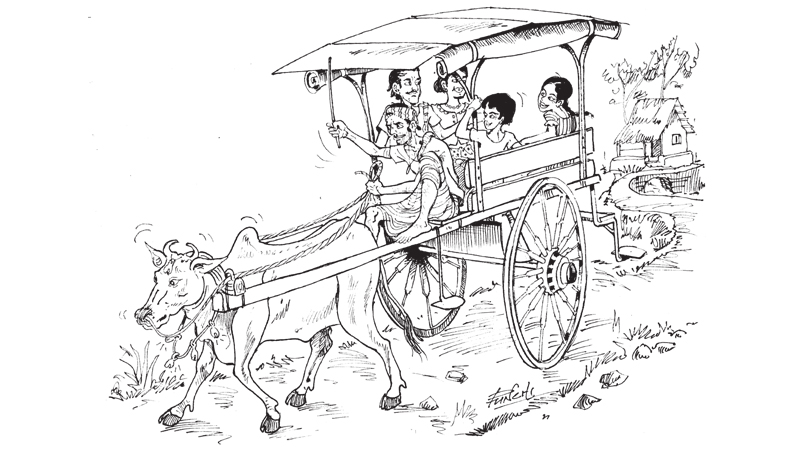When I was your age…- BY R.S. KARUNARATNE
Source:Sundayobserver
Every time I asked my father for 10 cents to cover the bus fare to school, I would get the standard reply: “When I was your age I did not get any pocket money. So, I walked two miles barefoot uphill both ways.” Listening to him was a kind of torture when he started criticising the wimpy generation I belonged to.
I believe my father too had to endure the same verbal treatment from his folks. They also would have told him. “When I was your age we did not have three-wheelers or a regular bus service.” With this knowledge comes the strange satisfaction that I will be able to treat my children in a better way.
Admonitions
When you become a parent or a grandparent, you are in a position to build up an arsenal of admonitions tailor-made for the next generation. I sat down in my easy chair thinking of proper admonitions.
When I was your age I had to walk more than two miles every morning to attend school perched on a hilly area. I did not ask for the bus fare because there were no buses running in that god-forsaken village. If we had to attend a wedding or funeral in a faraway place, we had to travel by a buggy-cart drawn by a single bull. About four grown-up people could travel in a buggy-cart. The roads were not macadamised and there were puddles and stones along the dusty road. The bull kept on pulling the cart along the bumpy road quite unmindful of the discomfort of those who travelled.
World War II was in full swing. Those who were living in remote villages managed to find something to eat except rice or bread. Sometimes we were warned not to light any lamp at night because of bombardments. Children did not mind going to bed earlier than usual. During the daytime, villagers did their cultivations and children attended school.
There were no televisions or telephones at the time. However, we listened to a big radio owned by a well-to-do villager. One day we heard that Colombo had been bombed by the Japanese. But we did not know where Colombo was or who the Japanese were. I saw a telephone only when I visited a nearby town. I saw a man dialling a number with his finger. After dialling one digit he had to wait for some time to dial the next digit. He had to dial the number while holding a heavy receiver. It was quite fun to see someone dialling a number and say ‘Hello’ to a man or woman at the other end. To make a phone call we had to go to a post office in a nearby town. We had to book a call and wait for several hours to get the connection.
We did not have washing powers, washing machines, washing liquids or modern laundries. The only detergent we had was soap. We had to beat our clothes against rocks in the stream. Women were especially good at beating clothes against rocks after applying soap. There were a few old-fashioned laundries where the clothes were cleaned manually. They too used the same formula of beating clothes against rocks in the stream. They also used starch to make trousers and shirt collars stiff.
There were no cinema halls even in the nearby towns. A man carrying a big box and a tripod visited the village from time to time. He charged 5 cents from each person to show a film. We had to look through a small hole in the box and the man operated a machine by hand. Later temporary cinema halls came to towns. They showed Indian films in a tent. As there was no enclosure even snakes and water monitors too came to see the films! Anyway it was big fun to see a film in one of those tents.
There were no studios even in towns. A few men used to visit the village with their box cameras. They charged Re 1 to take your photograph. They warned us not to smile when they took photographs. When an elderly man questioned the photographer, he said if you smiled your teeth would appear long! Today, however, the photographer would ask you to say “Cheese.” That is why we see smiling faces in photographs.
At school we were asked to save money. As there were no banks we went to the post office to deposit money. The counter officer would paste a label mentioning the amount deposited and date-stamp it. If you wanted to withdraw any money from your passbook, you had to produce a witness known to the postmaster. As there were no National Identity Cards, depositors had to seek the assistance of postmen to withdraw money. Times have changed and today, you can withdraw money from an ATM without wasting your time.
Gramophones
We did not have cassette recorders, CDs, DVDs or CD players, but there were big round records and hand-operated gramophones. If we had all of the scratches memorised, we could be waiting by the record player when it started to skip. No wedding was complete without a gramophone. More than half a century later I am trying to impart Albert Einstein’s words: “Never forget that science is just that kind of exploring and fun.” Today science courses introduce more new vocabulary than foreign language classes do. As a result, some students think that science is meant only for people like Einstein.
Although we wanted to explore the world science was not taught to us. As a result, old folks do not know how to answer children’s questions. One day a child asked an elderly man why it is dark at night. Without giving him a lengthy answer, he said, “Let’s find out and explore.” The trick is that we should give children time to think.
Adults always expect quick answers to their questions. Sometimes they wait only one second or even less for a response. A child needs more time to think. He usually responds with a more logical and creative way. You should never exhort a child to think because he is always thinking without your telling him to. Real-life impressions of nature are more memorable than a textbook lesson. Let children look at their fingertips through magnifying glass to understand why they should wash their hands before meals. I believe modern teachers are better equipped to handle such delicate situations. Everyday activities can teach us many useful lessons. Children can learn a great deal about physics and engineering simply by flying a kite.
Our parents never bought us toys from shops. Sometimes they would give us an old bicycle rim to play with. We used to roll it up and down the dusty roads. Anyway look for toys that children can safely take apart and put back together again. Otherwise children may think learning happens only at school. When you become an adult, you will realise that learning is something to be enjoyed every day for a lifetime!
karunaratners@gmail.com









